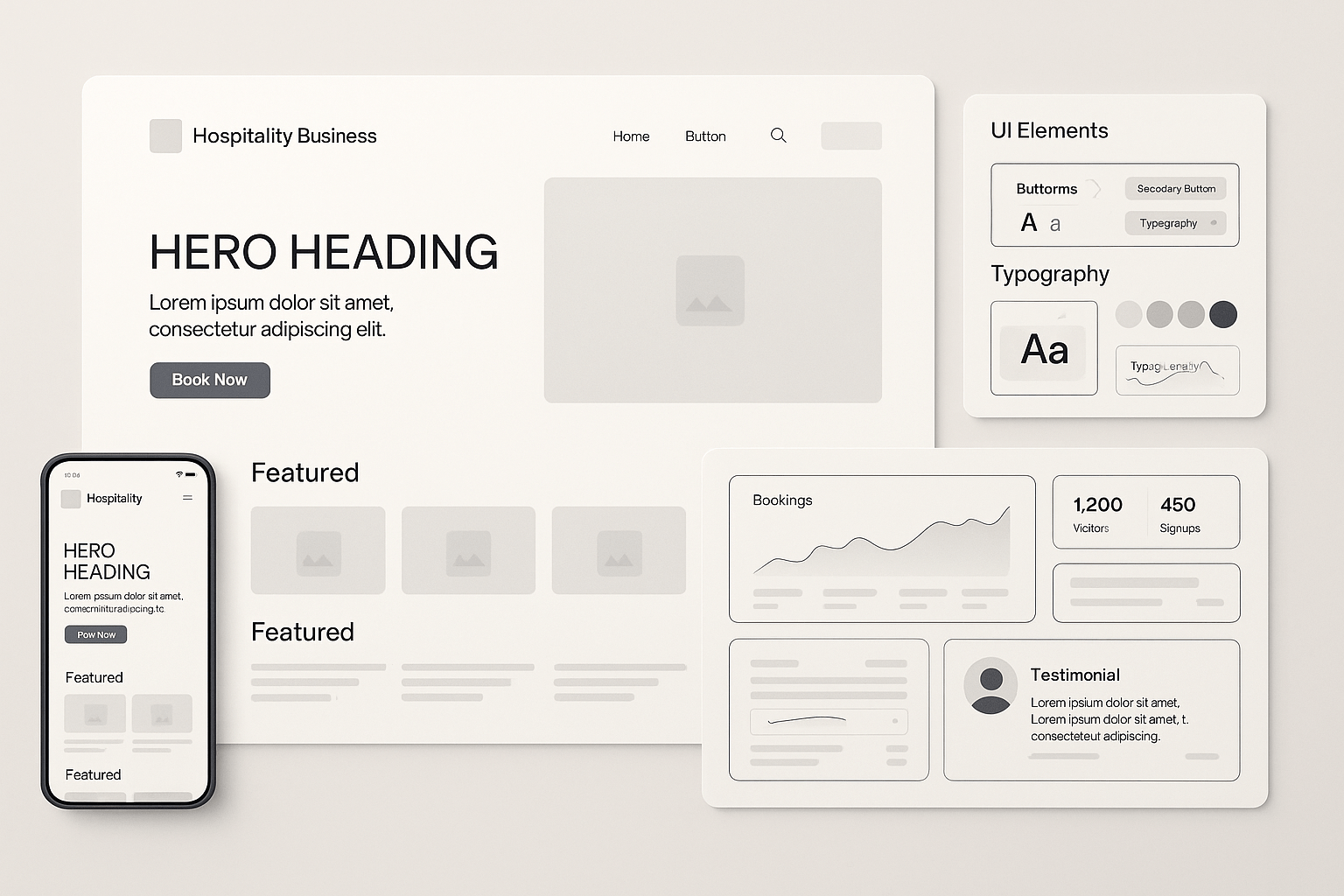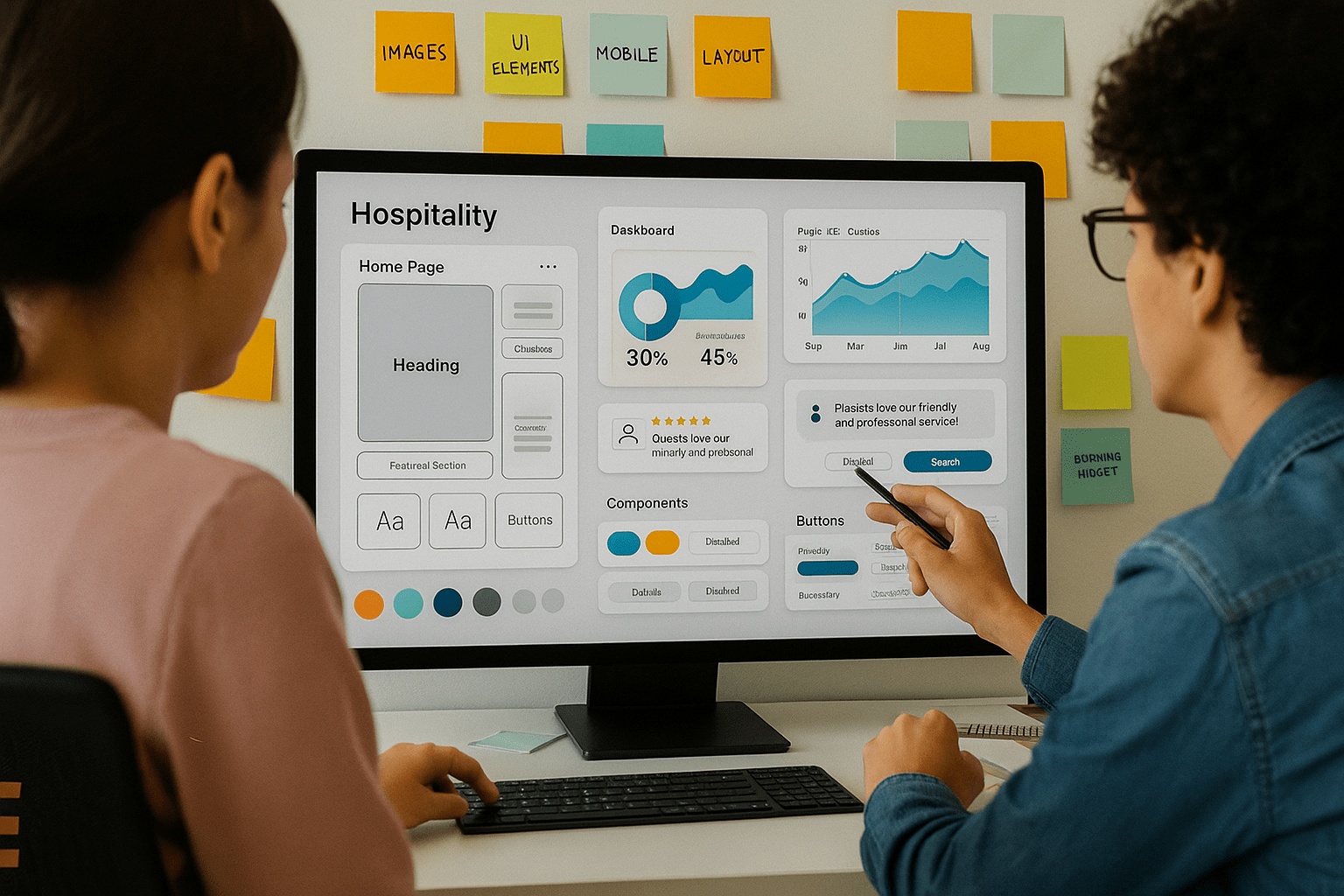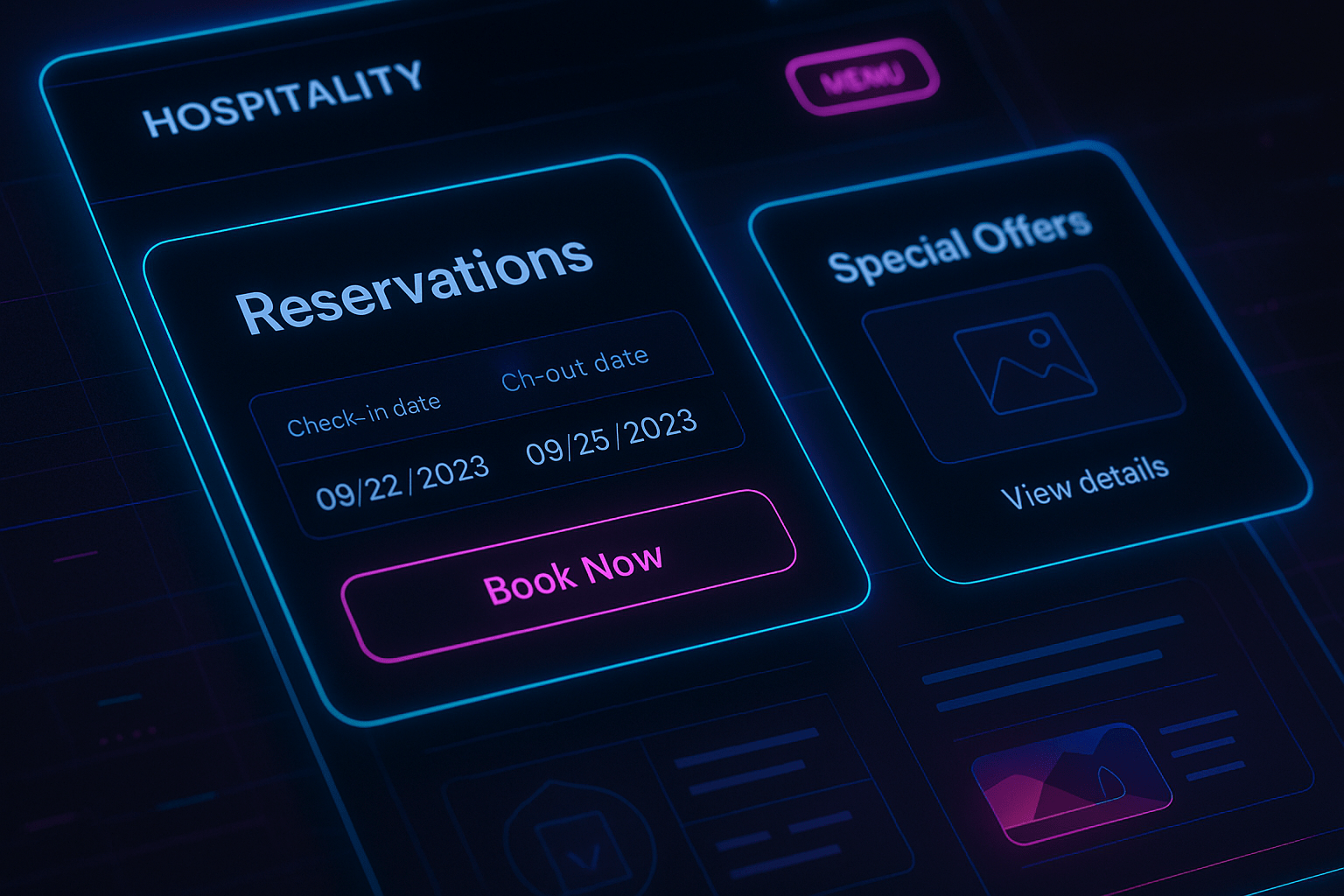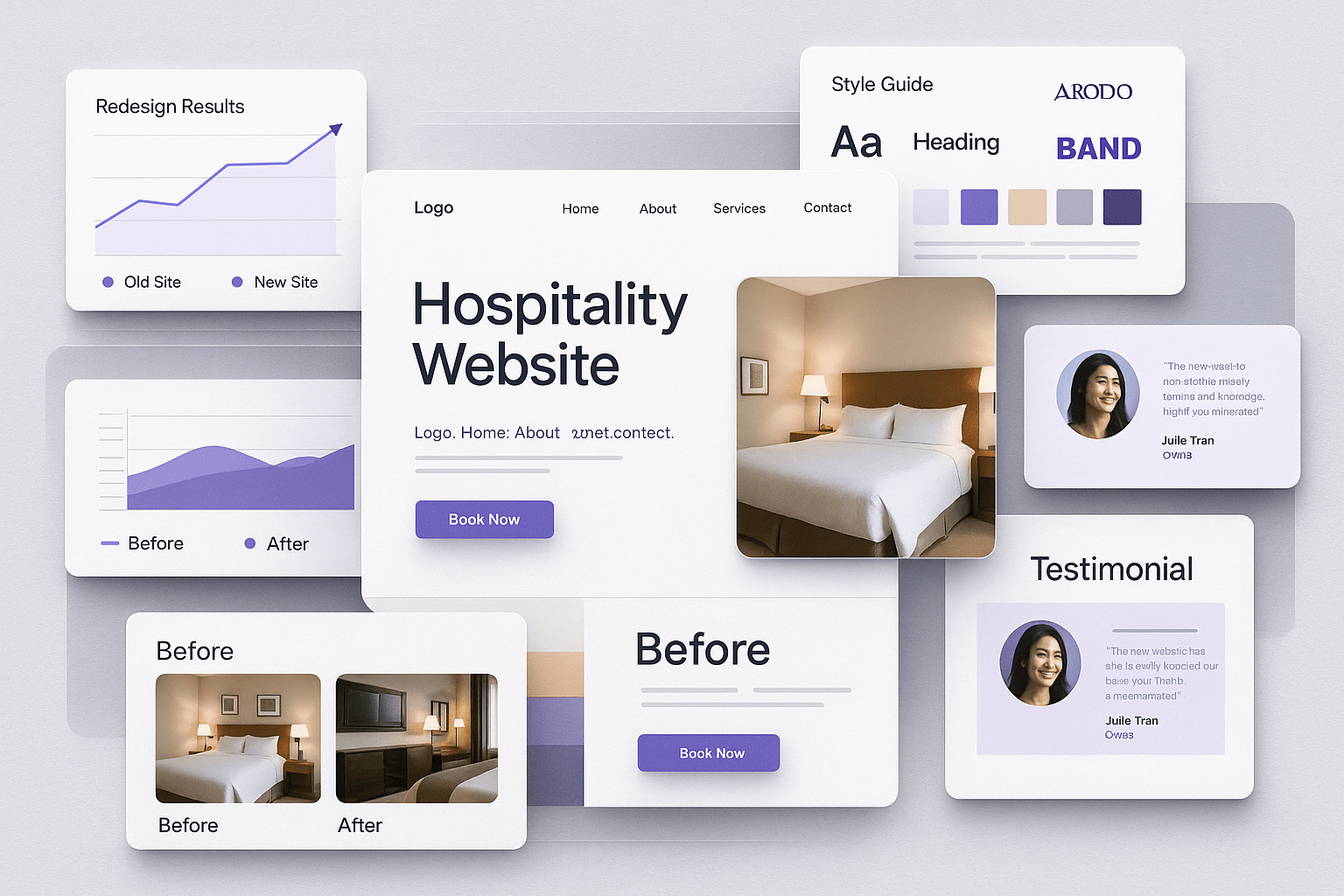The Future of Web Design in Hospitality Businesses
by Design Delulu Editorial · September 15, 2025

The hospitality industry faces unique digital challenges that can make or break guest experiences before they even step through your doors. From frustrated potential guests abandoning booking processes to missed opportunities due to poor mobile experiences, hospitality businesses need web design solutions that convert visitors into loyal customers. Modern web design for hospitality businesses isn't just about aesthetics—it's about creating seamless digital experiences that reflect the quality of service guests can expect in person.
Why Hospitality Businesses Need Web Design
Key Challenges They Face
- High Bounce Rates and Low Conversions: Many hospitality websites fail to capture visitor interest within the critical first few seconds. Poor navigation, slow loading times, and unclear value propositions drive potential guests to competitors before they explore available services.
- Mobile Experience Failures: With over 60% of hospitality searches happening on mobile devices, businesses lose significant revenue when their websites aren't optimized for smartphones and tablets. Difficult booking processes, unreadable text, and slow mobile performance directly impact bottom-line results.
- Trust and Credibility Issues: Guests need confidence before making reservations or bookings. Outdated designs, missing testimonials, unclear policies, and poor visual presentation create doubt about service quality and professionalism.
- Complex Booking Systems: Overly complicated reservation processes, hidden fees, and unclear availability displays frustrate users and lead to abandoned bookings. Every additional step in the booking funnel represents potential lost revenue.
How Web Design Solves Them
- Conversion-Optimized User Experience: Professional web design creates clear user journeys that guide visitors from initial interest to completed bookings. Strategic placement of calls-to-action, intuitive navigation, and compelling visual storytelling increase conversion rates significantly.
- Mobile-First Responsive Design: Modern hospitality websites prioritize mobile experiences with touch-friendly interfaces, fast loading speeds, and streamlined booking processes that work seamlessly across all devices.
- Trust-Building Elements: Professional design incorporates social proof, customer testimonials, security badges, and clear contact information to build credibility and reduce booking anxiety.
- Streamlined Booking Integration: Well-designed websites integrate seamlessly with booking systems, displaying real-time availability, transparent pricing, and simplified reservation processes that encourage completion.

Essential Features of Web Design for Hospitality Businesses
Must-Have Tools, Design Elements, and Workflows
Visual Storytelling Components: High-quality image galleries, virtual tours, and video content showcase amenities and experiences effectively. Professional photography integration and optimized media delivery create emotional connections with potential guests.
Real-Time Booking Integration: Seamless integration with property management systems allows instant availability checking, dynamic pricing display, and secure payment processing. Calendar widgets and booking forms should be prominent and user-friendly across all pages.
Local SEO Optimization Elements: Location-based content, embedded maps, local business schema markup, and area attraction information help hospitality businesses rank higher in local search results and attract nearby travelers.
Review and Testimonial Systems: Integrated review displays from Google, TripAdvisor, and other platforms build social proof. Customer testimonial carousels and photo galleries from satisfied guests provide authentic endorsements.
Real-World Examples
Boutique Hotel Success: A boutique hotel increased direct bookings by 45% after implementing a mobile-first redesign featuring streamlined booking flows, professional photography, and integrated guest reviews. The new design reduced booking abandonment from 78% to 32%.
Restaurant Chain Implementation: A regional restaurant chain saw 60% improvement in online reservations after redesigning their websites with simplified menu displays, location-based booking systems, and mobile-optimized ordering processes.
Resort Transformation: A mountain resort achieved 35% increase in advance bookings through enhanced visual storytelling, seasonal content updates, and integrated activity booking systems that allowed guests to plan complete experiences.

Common Mistakes to Avoid
Typical Pitfalls in Web Design for Hospitality Businesses
Overcomplicating Navigation Structures: Many hospitality websites create confusing menu systems with too many options and unclear categories. Complex navigation frustrates users and increases bounce rates, particularly on mobile devices.
Neglecting Page Loading Speed: Hospitality websites often suffer from slow loading times due to unoptimized images, excessive plugins, or poor hosting choices. Each second of delay can result in 7% reduction in conversions.
Ignoring Accessibility Standards: Failing to implement proper accessibility features excludes potential guests with disabilities and can result in legal compliance issues. Poor color contrast, missing alt text, and keyboard navigation problems are common oversights.
Inconsistent Brand Presentation: Many businesses fail to maintain consistent visual branding across their websites, creating confusion about service quality and professionalism. Inconsistent fonts, colors, and messaging dilute brand impact.
How to Do Better
Implement User-Centric Design Principles: Conduct user testing with actual guests to identify pain points and optimize user journeys. Focus on reducing cognitive load and making information easily discoverable.
Optimize Performance Continuously: Implement image compression, content delivery networks, and caching strategies to maintain fast loading speeds. Regular performance auditing ensures optimal user experience.
Follow Web Accessibility Guidelines: Implement WCAG 2.1 compliance measures including proper heading structures, alternative text for images, and keyboard navigation support to serve all potential guests effectively.
Develop Comprehensive Brand Guidelines: Create and maintain consistent visual and messaging standards across all digital touchpoints to reinforce brand identity and build trust.

SEO / Growth Best Practices
Optimization Tips Specific to Hospitality Businesses
Local Search Optimization: Implement location-specific keywords, create individual pages for each property location, and maintain accurate Google My Business profiles. Include local landmarks, attractions, and geographic modifiers in content strategy.
Seasonal Content Strategy: Develop content calendars that align with booking seasons, local events, and travel patterns. Create targeted landing pages for peak booking periods and special promotions.
Schema Markup Implementation: Use hospitality-specific schema markup for hotels, restaurants, and events to enhance search engine understanding and increase rich snippet opportunities in search results.
Content Marketing Integration: Develop travel guides, local attraction information, and experience-focused content that attracts potential guests during research phases and builds domain authority.
Leveraging Web Design for Visibility and Results
Conversion Rate Optimization: Implement A/B testing for booking forms, call-to-action buttons, and page layouts to continuously improve conversion performance. Track user behavior through heatmaps and analytics to identify optimization opportunities.
Social Media Integration: Design websites that seamlessly integrate with social media platforms, encouraging user-generated content and social sharing. Instagram feeds, social proof widgets, and sharing buttons amplify marketing reach.
Email Marketing Coordination: Design websites that capture email addresses effectively through valuable content offers, newsletter signups, and post-booking engagement opportunities to build long-term customer relationships.
Analytics and Measurement Systems: Implement comprehensive tracking systems to measure website performance, booking conversions, and user engagement metrics. Use data-driven insights to guide ongoing optimization efforts.
Ready to Transform Your Hospitality Business?
Professional web design can revolutionize how your hospitality business attracts, engages, and converts potential guests. By implementing user-centric design principles, optimizing for mobile experiences, and focusing on conversion optimization, you can significantly increase direct bookings and reduce dependency on third-party booking platforms.
👉 Ready to improve your hospitality business with professional web design? Explore Design Delulu’s Web Design Services to discover how we can help you create a website that converts visitors into loyal guests.
Additional Resources
- View Our Portfolio to see hospitality design transformations
- Book a Strategy Call to discuss your specific needs
- Explore Our Tools for ongoing website optimization